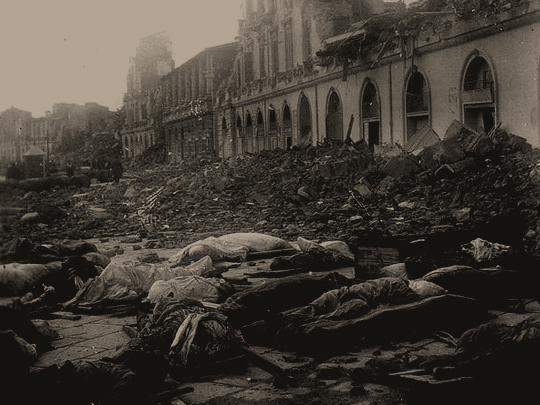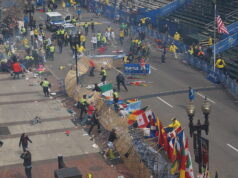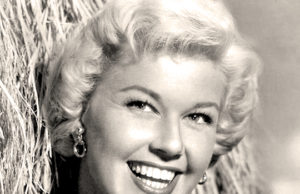Wikimedia Commons / CC-BY-SA-3.0 / GFDL
1 – Messina earthquake
The 1908 Messina earthquake occurred on December 28 in Sicily and Calabria, southern Italy with a magnitude of 7.1.
The cities of Messina and Reggio Calabria were almost completely destroyed, with between 75,000 and 200,000 lives were lost.
Moments after the earthquake, a 39-foot tsunami struck nearby coasts, causing even more devastation.
91% of structures in Messina were destroyed, and some 70,000 residents were killed.
Rescuers searched through the rubble for weeks, and whole families were still being pulled out alive days later, but thousands remained buried there.
In 2008 it was proposed that the concurrent tsunami was not generated by the earthquake, but rather by a large undersea landslide it had triggered.
2 – King Carlos I of Portugal and Prince Luis Filipe are assassinated
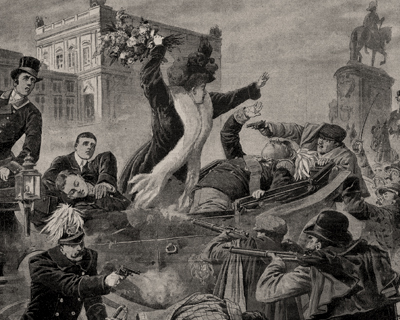
The Lisbon Regicide was the name given for the assassinations of King Carlos I of Portugal and his heir-apparent, Prince Royal Luís Filipe, Duke of Braganza.
The assassins were sympathetic to Republican interests and aided by elements within the Portuguese Carbonária, disenchanted politicians, and anti-monarchists.
The events occurred on 1 February 1908 along the banks of the Tagus River in Lisbon. As the royal carriage passed through Rua do Arsenal several shots were fired from the crowd. Inside the carriage was a bloodbath.
King Carlos I died immediately from a bullet to the neck and both his sons were hit by bullets. Only Queen Amélie was unharmed, even though she had tried to shield their youngest son, Manuel.
In the aftermath, the assassins, Alfredo Costa and Manuel Buíça, were killed by police, to the detriment of any further investigation. Their bodies were taken to the nearby police station, along with other suspects.
Sabino Costa, a monarchist jewelry store worker, was mistaken for a third assassin in the crowd and shot twice in the head. The assassinations were the beginning of the end to the Monarchy.
It survived until the 5 October 1910 Revolution when Portugal’s Republican Party successfully conducted a coup d’etat initiating a republican regime in the Iberian country which has remained ever since.
3 – Jack Johnson becomes the 1st black heavyweight champion
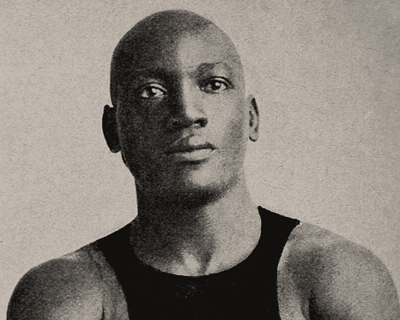
Jack Johnson became the first African American to win the world heavyweight title when he knocked out Tommy Burns in the 14th round.
Johnson, who held the heavyweight title until 1915, was despised by whites for his defiance of the ‘Jim Crow’ racial conventions of early 20th-century America.
The bout took place in Rushcutter’s Bay on the outskirts of Sydney, Australia, on December 26, 1908. Few of the 20,000 spectators cheered for Johnson as he dominated Burns and became the heavyweight champion of the world.
Johnson’s reception upon returning to the United States was equally lukewarm, and most whites were appalled by his marriage to a white woman. Johnson refused to keep a low profile in the face of racism and instead lived an excessively flamboyant lifestyle.
Johnson defeated several challengers, before former champion Jim Jeffries came out of retirement to try to beat him.
In a fight held at Reno, Nevada, on July 4, 1910, Johnson became the first boxer to knock down Jeffries, and in the 15th round, Jeffries’ corner threw in the towel. The outcome of the match prompted racial violence and rioting across the United States.
In 1912, Johnson was convicted of transporting an unmarried woman (his secretary) across state lines for ‘immoral purposes’. This law was drafted primarily to prevent prostitution and the white slave trade.
Johnson was sentenced to a year in prison and released on bond pending an appeal. He took the opportunity to flee the United States disguised as a member of a black baseball team.
Johnson lived in exile for the next seven years and continued to defend his title in bouts in Europe and elsewhere. On April 5, 1915, he lost the heavyweight title when he was knocked out by Jess Willard in the 20th round of a fight in Havana, Cuba.
There were rumors that Johnson threw the championship in order to have the charges against him dropped.
The charges were not dropped, however, and when Johnson returned to the United States in 1920 he was arrested by U.S. marshals. He was sent to a federal prison in Kansas to serve his year sentence.
After his release, Johnson boxed occasionally but never regained his former stature. His fortunes steadily diminished, and near the end of his life, he worked as a vaudeville performer.
He died in a car accident in 1946. He is still remembered as one of the greatest defensive boxers in heavyweight history.


